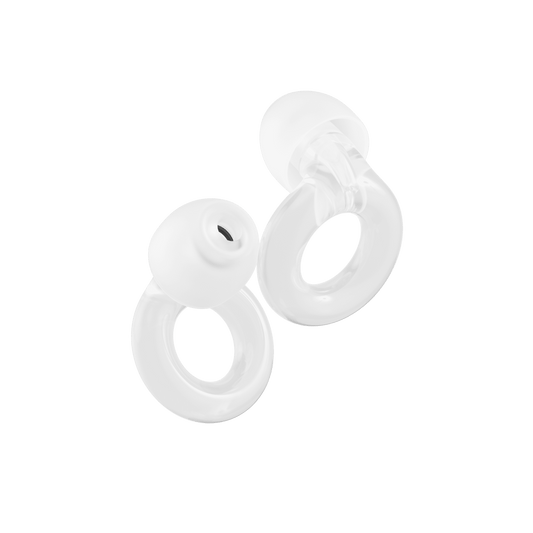Die wichtigsten Erkenntnisse
- Sich beim Lernen zu konzentrieren, kann manchmal unmöglich erscheinen, vor allem, wenn du dich leicht ablenken lässt.
- Die Unfähigkeit, sich zu konzentrieren, kann Dinge wie Entscheidungsfindung, Stillsitzen oder sogar klares Denken fast unmöglich machen.
- Wenn du lärmempfindlich bist oder unter ADHS leidest, ist es wahrscheinlicher, dass der Lärmpegel deine Konzentration beeinträchtigt.
- Es gibt Dinge, die du tun kannst, um dich besser konzentrieren zu können, z. B. Atemtechniken ausprobieren, einen Lernplan erstellen, dir klare Ziele setzen und vor dem Lernen leichte Übungen machen.
- Die Organisation deines Umfelds und die Schaffung eines idealen Lernplatzes sind wichtig, damit du dich konzentrieren kannst
- Lärmreduzierende Ohrstöpsel können helfen, unerwünschte Geräusche auszublenden und deine Konzentration zu lenken.
Snacks: erledigt.
Es ist Zeit zum Lernen. Und du bist bereit.
*Fängt an, die erste Zeile zu lesen*
Bleib dran. Dein Handy geht aus. Du solltest vielleicht die sozialen Netzwerke checken. Du willst doch nichts Wichtiges verpassen, oder?
Außerdem könnte dein Kaffee nachgefüllt werden.
Und natürlich ist die Katze hungrig. Du hast schon wieder die Essenszeit vergessen .
So ist das eben. Und ehe du dich versiehst, hast du die erste Zeile schon 15-mal gelesen und deine leere Notizbuchseite starrt dich direkt an.
Fällt es dir schwer, dich beim Lernen zu konzentrieren?
Heutzutage gibt es so viele Ablenkungen: Apps, soziale Medien, Lärm. Ganz zu schweigen von deinem Erzfeind: deinen eigenen umherwandernden Gedanken.
Wir sind darauf angewiesen, dass wir uns konzentrieren, um durch den Tag zu kommen.
Und wenn es uns schwerfällt, diese Konzentration aufrechtzuerhalten, kann sich das negativ auf wichtige Bereiche unseres Lebens auswirken. Es ist nicht nur frustrierend und demotivierend, sondern kann sich auch stark auf dein Selbstwertgefühl auswirken.
Um dir dabei zu helfen, haben wir diesen Artikel mit hilfreichen Tipps gefüllt, wie du dich beim Lernen konzentrieren kannst. Bevor wir beginnen, wollen wir uns die Symptome ansehen, die mit mangelnder Konzentration einhergehen.

Unkonzentriertheit: Was sind die Auswirkungen?
Wir alle erleben die Welt anders. Daher ist es nur logisch, dass sich Konzentrationsschwierigkeiten auch auf jeden Menschen anders auswirken.
Einige häufige Symptome, die bei dir auftreten können, sind:
- Probleme mit dem Stillsitzen
- Schwierigkeiten, Entscheidungen zu treffen
- Probleme mit dem Kurzzeitgedächtnis
- Schwierigkeiten, klar zu denken
- Du verlierst Dinge und weißt nicht mehr, wo sie sind
- Unvorsichtige Fehler machen
- Mangel an körperlicher und geistiger Energie
- Angstzustände oder sogar Depressionen
Es gibt auch andere Erkrankungen, die zu deiner Konzentrationsschwäche beitragen können, wie zum Beispiel ADHS oder Lärmempfindlichkeit.
Wie man sich auf das Lernen konzentriert
Du fühlst dich oft abgelenkt. Du verpasst Abgabetermine und deine schwindende Konzentrationsfähigkeit wirkt sich auf deine Arbeit aus. Es ist an der Zeit, deinen Fokus zu zügeln und sicherzustellen, dass du deine Ziele erreichst.
Hier sind einige Möglichkeiten, dich auf das Lernen zu konzentrieren:
1. Schaffe eine ideale Lernumgebung
Menschen sind Gewohnheitstiere. Idealerweise wählst du einen speziellen Lernort, den du zu deinem eigenen machen kannst, damit dein Gehirn weiß, dass es Zeit zum Lernen ist, wenn du jeden Tag dorthin zurückkehrst.
Finde einen kleinen Bereich, den du jeden Tag für ein paar Stunden für dich alleine haben kannst. Vielleicht ist die Bibliothek der Ort deiner Wahl, an dem du dich zurückziehst, oder du kommst mit der Geräuschkulisse eines Cafés besser zurecht. Wie auch immer du dich entscheidest, achte darauf, dass der von dir gewählte Lernort die folgenden Eigenschaften hat:
- Ein bequemer Stuhl
Wenn du stundenlang sitzen wirst, sollte es ein Stuhl sein, der dich unterstützt und deine Haltung fördert.
Das Letzte, was du willst, ist, dass du ständig in deinem Sitz hin und her rutschst.
Die besten Arbeitsstühle erhöhen nachweislich das Energieniveau, steigern die Produktivität und verbessern die Konzentration.
- Ausreichend Platz
Studieren nimmt überraschend viel Platz in Anspruch. Du hast deine Kaffeetassen, Hefte, Lehrbücher, deinen Laptop, Stifte und Bleistifte (ganz zu schweigen von den ganzen Snacks).
Stell sicher, dass dein Raum groß genug für alles ist, was du brauchst - wenn du das Gefühl hast, dass du eingepfercht bist, wirst du dich nur frustriert und abgelenkt fühlen.
- Ein Stromanschluss
Du hast es dir in einem Café gemütlich gemacht und bist mit deinem Studium voll im Plan! Deine Aufgabe ist fast fertig. Du hast sogar den Satz des Pythagoras im Kopf.
Aber dann... stirbt der Akku deines Laptops. Und natürlich steht dir im Café kein Strom zur Verfügung.
Wenn du stundenlang am Stück lernst, solltest du sicherstellen, dass du Zugang zu einer Steckdose hast. Wahrscheinlich wirst du sie brauchen, um deinen Laptop am Laufen zu halten.
2. Klare, präzise Ziele setzen
Was ist der wahre Grund, warum du studierst? Was ist das Endziel?
Denke über diese Fragen nach und schreibe dann die Antworten auf. Klare und greifbare Ziele zu haben, ist eine gute Möglichkeit, dein Gehirn daran zu erinnern, wie wichtig dein Studium ist und warum es wichtig ist, konzentriert zu bleiben.
Um einen maximalen Effekt zu erzielen, solltest du so detailliert wie möglich vorgehen.
Zum Beispiel:
"Ich möchte [hier die Note einfügen] erreichen, damit ich auf mein Traumcollege gehen kann."
"Ich möchte gesunde Lerngewohnheiten entwickeln, um immer mein Bestes zu geben und mir das Leben leichter zu machen".
Bewahre deine Zielliste gut sichtbar in deinem Lernraum auf. Vielleicht schreibst du sie sogar auf ein Post-it und klebst sie vor dich hin.
Dann kannst du dich jedes Mal, wenn die Konzentration nachlässt, an dein Ziel erinnern.
3. Blende alle Ablenkungen aus
Aus den Augen, aus dem Sinn. So lautet das Sprichwort, oder? Und genau da muss dein Handy hin - an einen Ort, an dem du es nicht sehen kannst.
Wusstest du, dass wir 23 Minuten und 15 Sekunden (im Durchschnitt) brauchen, um uns nach einer Unterbrechung wieder auf unsere Arbeit zu konzentrieren?
Wir alle tun es. Du nimmst dein Handy jedes Mal in die Hand, wenn der Bildschirm blinkt. Du rufst jedes Mal eine E-Mail ab, wenn du eine Benachrichtigung siehst.
Die Wahrheit ist: Telefone sind der Tod der Produktivität.
Hier sind einige Möglichkeiten, um diese Ablenkungen loszuwerden:
- Website-Blocker verwenden
- Schalte Benachrichtigungen aus
- Verstecke elektronische Geräte komplett außer Sichtweite
Einer der Hauptverursacher sind zweifelsohne die sozialen Medien.
Laut der Harvard Universitätdurchläuft unser Körper einen bestimmten Prozess, wenn wir eine Benachrichtigung aus den sozialen Medien erhalten, der es uns unmöglich macht, konzentriert zu bleiben.
Unser Gehirn produziert eine Chemikalie namens Dopamin. Sie ist dafür verantwortlich, dass wir uns gut fühlen und wird mit all den Dingen in Verbindung gebracht, die wir lieben: Essen, Bewegung, Tiere, Spiele und natürlich die Bestätigung durch die sozialen Medien.
Und Dopamin macht süchtig - je mehr wir davon bekommen, desto mehr wollen wir. Das ist einer der Gründe, warum wir ständig auf unser Handy schauen. Und unsere Aufmerksamkeitsspanne wird dabei immer kürzer.
Schalte also diese "Wohlfühl"-Ablenkungen aus, wenn du dich konzentrieren musst. So kannst du dich nicht nur länger konzentrieren, sondern auch deine zwanghafte Smartphone-Sucht verringern.
4. Einen Lernplan erstellen
Ein Zeitplan ist eine gute Möglichkeit, um deine Zeit zu managen, deine Fortschritte zu verfolgen und eine Routine zu etablieren.
Hier sind unsere besten Tipps, wie du einen Zeitplan erstellen kannst, der zu dir passt:
- Füge Fristen hinzu
Lernst du für deine Abschlussprüfungen? Oder steht ein wichtiger Abgabetermin bevor?
Was auch immer deine Deadline sein mag, stelle sicher, dass du einen Zeitplan erstellst, der all diese wichtigen Termine berücksichtigt. Ein Ziel vor Augen zu haben, kann dir helfen, deine Konzentration zu verbessern und dich zu fokussieren.
- Erlaube dir freie Zeit
Ein gesundes Gleichgewicht zwischen Lernen und Leben ist wichtig. Deshalb solltest du regelmäßige Pausen, freie Tage, abendliche Auszeiten und Momente zum Entspannen und Auftanken einplanen.
Pausen können die Produktivität steigern, den Stresspegel senken und die Konzentration verbessern.
- Verwende eine Farbcodierung
Wenn du eher ein visueller Mensch bist, kannst du deinen Stundenplan farblich kennzeichnen, um sicherzustellen, dass du für jedes Thema genug Zeit hast.
Wenn du siehst, dass du deine Zeit effektiv einteilst, kann das Wunder bewirken, dass du dich auf das Ziel konzentrierst.
5. Nimm dich beim Lernen auf
Okay, das klingt jetzt vielleicht komisch. Aber für manche kann es wirklich funktionieren.
Denk mal drüber nach: Es geht um Verantwortlichkeit. Wenn du aufgezeichnet wirst, ist es wahrscheinlicher, dass du weitermachst, anstatt ständig unnötige Pausen einzulegen.
Es ist eine ständige Erinnerung daran, dass du dich zum Lernen verpflichtet hast. Du brauchst diese extra Snackpause nicht. Das stets wachsame Auge wird dich sehen.
6. Schau dir Focusmate an
Es ist neu und anders - und zufällig auch das ultimative Werkzeug für Verantwortlichkeit beim Lernen.
Wie funktioniert es?
Focusmate ist ein kostenloser Service, der dich mit anderen Studierenden auf der ganzen Welt zusammenbringt. Sobald ihr mit einem realen Partner verbunden seid, verpflichtet ihr euch beide, mindestens einmal am Tag 50 Minuten lang zu lernen.
Während der 50 Minuten schaltet ihr beide eure Webcam ein, so dass ihr euch gegenseitig sehen und hören könnt, während ihr lernt.
Wenn du deinen Verpflichtungen nicht nachkommst, stuft dich das System ab. Und wenn deine Punktzahl unter ein bestimmtes Niveau fällt, sperrt dich das System schließlich aus.
Bleibst du aber engagiert und beendest deine Sitzung, wird dich das System mit Punkten belohnen.
Wenn du also zu den Menschen gehörst, die sich durch ein Punktesystem motivieren lassen, ist dieses Spiel genau das Richtige für dich (hey, Gamer).
7. Beherrsche die Pomodoro-Technik
Das ultimative Werkzeug, um Prokrastination zu besiegen und sich zu konzentrieren, die Pomodoro-Technik folgt einem einfachen, aber äußerst effektiven Muster.
Hier ist es:
- Wähle eine Aufgabe
- Stell einen Timer ein
- Arbeite daran ohne Unterbrechung, bis der Timer piept
- Mache eine kurze Pause
Dann wiederhole sie.
Normalerweise wird empfohlen, 25 Minuten zu lernen und dann 5 Minuten Pause zu machen. Aber natürlich kommt es ganz darauf an, was für dich am besten funktioniert.
Wenn du dir eine Pause gönnst, hat dein Gehirn Zeit, sich zu erholen und sich auf die nächste Lerneinheit vorzubereiten.
Du kannst dich nicht nur besser konzentrieren und so effektiver lernen, sondern die Pomodoro-Technik gibt dir auch ein besseres Gefühl für die Zeit, die du für die Erledigung von Aufgaben brauchst, sodass du einen effektiveren Zeitplan erstellen kannst.
Der Schlüssel zum Erfolg sind null Unterbrechungen. Keine Kaffeepausen, keine Pausen auf der Toilette. Arbeite einfach durch, bis der Timer abläuft.
Probiere es aus! Du wirst von der Wirkung überrascht sein.
10M+ happy customers
Unsere Ohrstöpsel
8. Benutze lärmreduzierende Ohrstöpsel
Für manche Menschen kann Lärm die größte Ablenkung überhaupt sein. Laute Mitbewohner. Bauarbeiten. Laute Unterhaltungen.
Und wenn du krampfhaft versuchst, eine Deadline einzuhalten, kann das zu einer wirklich stressigen Erfahrung werden.
Lärmreduzierende Ohrstöpsel wie unsere Loop Experience Plus helfen dir, dich zu konzentrieren und dein Studium wieder in den Griff zu bekommen.
Ihr ausgeklügelter Akustikkanal, die Membran und der Filter reduzieren den Lärm um bis zu 23 Dezibel (dB) und sind damit die idealen Ohrstöpsel, um den Fokus und die Konzentration aufrechtzuerhalten.
Die Stöpsel wurden mit dem Gedanken an den ultimativen Komfort entwickelt, sodass sie dich nicht stören, wenn du versuchst, dich zu konzentrieren.
Außerdem werden sie in einem praktischen kleinen Etui geliefert, damit du sie in deiner Schreibtischschublade oder deiner Lerntasche verstauen oder sogar an deinem Schlüsselbund befestigen kannst.
9. Probiere Atemübungen aus, bevor du anfängst
Tiefe Atemübungen steigern nachweislich die Konzentrationsfähigkeit deines Geistes.
Wenn du tief atmest, produziert dein Körper mehr Noradrenalin, einen Neurotransmitter, der deine Konzentration beeinflusst. Wenn du deine Atmung regulierst, kann sie deinen Noradrenalinspiegel optimieren und für einen konzentrierteren und ruhigeren Geist sorgen.
Hier ist eine einfache Atemübung, die dein Gehirn ruhig und konzentriert macht.
- Schließe deine Augen und atme 4 Sekunden lang tief durch deine Nase ein.
- Wenn du spürst, dass deine Lunge voll Luft ist, halte den Atem für 2 Sekunden an.
- Dann atme langsam und sekundenlang durch die Nase aus.
Probiere diese Übung dreimal vor Beginn jeder Lernsitzung aus.
10. Sorge dafür, dass dein Lernraum die richtige Temperatur hat
Wenn du lernst, möchtest du dich so wohl wie möglich fühlen - deshalb ist es wichtig, dass du dir bewusst bist, wie sich die Raumtemperatur auf dich auswirkt.
Wenn du in einem zu heißen Raum sitzt, ist es wahrscheinlich, dass du müde und frustriert bist und deine Aufmerksamkeitsspanne verkürzt wird. Forschungen haben ergeben, dass die optimale Temperatur zum Lernen bei 22°C liegt.
Wenn es dir also schwerfällt, dich beim Lernen zu konzentrieren, solltest du die Raumtemperatur überprüfen und sehen, ob sie angepasst werden kann.
11. Probiere Apps wie Brain FM oder Coffitivity aus
Lernst du effektiver, wenn du von Hintergrundgeräuschen umgeben bist? Oder fördert Stille deine Konzentration?
Was auch immer am besten funktioniert, es gibt eine App, die dir dabei hilft!
Für diejenigen, deren Konzentration bei Lärm um sie herum aufblüht, gibt es eine App namens Coffitivity. Sie ist dafür bekannt, dass sie nicht nur die Leistung, sondern auch die Gehirnfunktion fördert.
Wer sich aber nach Ruhe sehnt, sollte Gehirn.fm einen Versuch. Die App bietet wissenschaftlich untermauerte Musik, die dir hilft, dich zu konzentrieren.
12. Notiere dir, was dich ablenkt
Das mag seltsam erscheinen, aber es ist ein wirkungsvoller kleiner Tipp. Stell dir vor: Du sitzt da und lernst für deine Prüfung. Dann klingelt dein Telefon.
Anstatt schnell nachzusehen, was los ist, schreibst du es auf:
Nachrichten checken.
So hast du das Gefühl, dass du die Ablenkung erst einmal hinter dir gelassen hast und kannst sie später, wenn du nicht so viel zu tun hast, zur Priorität machen und dich wieder dem Lernen widmen.
Warum funktioniert das so gut?
Weil du einfach nur versuchst, dem Drang zu widerstehen, etwas zu tun, indem du es aufschreibst und damit aktiv wirst. Du blockierst den Drang nicht, sondern sagst deinem Gehirn, dass du gehandelt hast und dass du dich später damit befassen wirst.
13. Mach etwas Sport
Wir alle kennen die Auswirkungen von Sport auf unsere körperliche Gesundheit. Aber wusstest du, dass Bewegung auch für unser Gehirn wichtig ist, denn sie verbessert seine Fähigkeit, sich zu konzentrieren und neue Informationen zu behalten?
In der Tat, Forschung zeigen, dass eine bessere Durchblutung des Gehirns durch Sport die Konzentration für bis zu zwei oder sogar drei Stunden verbessern kann.
Sport kann auch den Schlaf und die Stimmung verbessern, was wiederum Angst und Stress reduziert - alles Dinge, die unsere Konzentrationsfähigkeit beeinträchtigen können.
Versuche also, vor dem Lernen etwas Sport zu treiben. Dadurch wird dein Gehirn besser durchblutet und du kannst dich besser konzentrieren, wenn du etwas lethargisch bist.
14. Lerne, nein zu sagen
Nein, ich kann jetzt nicht reden.
Nein, ich kann heute Abend nicht rauskommen.
Nein, ich kann mir im Moment keinen Film ansehen.
Natürlich musst du nicht alle deine sozialen Aktivitäten aufgeben. Aber du musst streng mit dir selbst sein.
Wenn du lernen musst, lass es die Leute wissen. Bleib stark. Und sorge dafür, dass das Handy außer Sichtweite bleibt.

Finde, was für dich funktioniert
Wie du dich beim Lernen konzentrieren kannst Nun, das ist nicht immer einfach. Es kann so aussehen, als ob dein Gehirn mit sich selbst kämpft und versucht, sich zu konzentrieren und die vielen Ablenkungen zu ignorieren, die das Leben für dich bereithält. Um deine Konzentration aufrechtzuerhalten, ist es wichtig, herauszufinden, was für dich funktioniert, denn bei jedem Menschen funktionieren andere Dinge.
Finde heraus, was deine Auslöser sind. Ist es Lärm? Oder brauchst du vielleicht eine angenehmere Lernumgebung? Vielleicht musst du ein bisschen experimentieren, um herauszufinden, wie du am besten lernst, aber mit ein bisschen Geduld wirst du es schaffen.
Viel Spaß beim Lernen!

Wie du den Lärm deiner Nachbarn abblockst
Lautstarke Nachbarn können schwer zu ertragen sein. Lies weiter, um herauszufinden, wie du den Lärm von deinen lauten...

Die wahren Auswirkungen von Lärmbelästigung und wie man sie bekämpfen kann
Was ist Lärmbelästigung? Einfach ausgedrückt ist Lärmbelästigung die Verbreitung von unerwünschten Geräuschen oder St...

Wie man mit Misophonie am Arbeitsplatz umgeht: Unsere Top-Tipps
Lass nicht zu, dass lästige Geräusche deinen Arbeitstag stören! Entdecke, wie du Misophonie besiegen und dich wieder ...



















